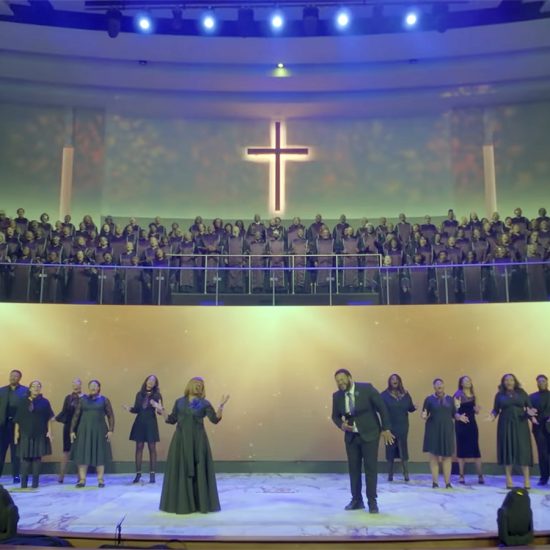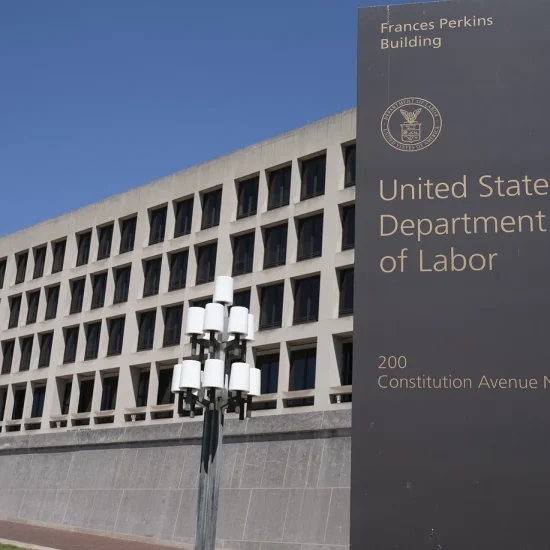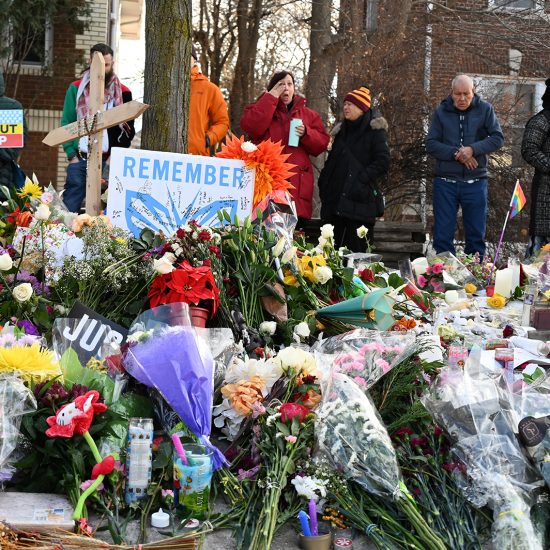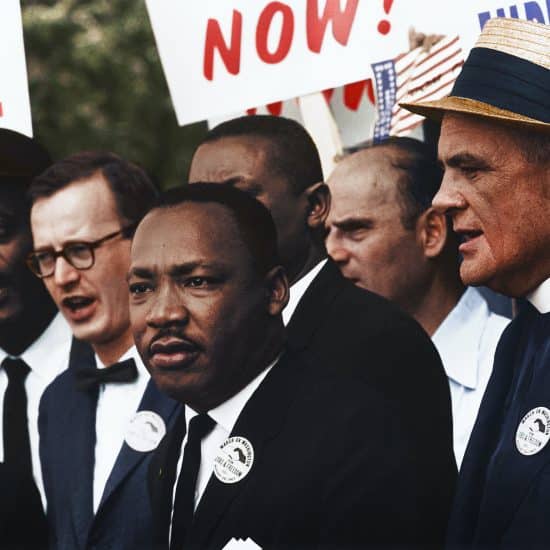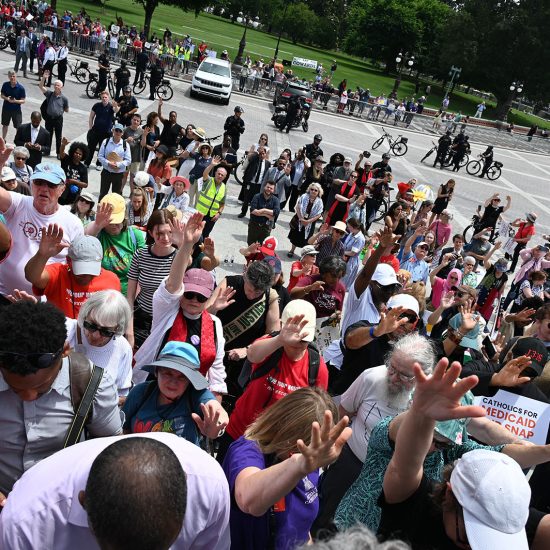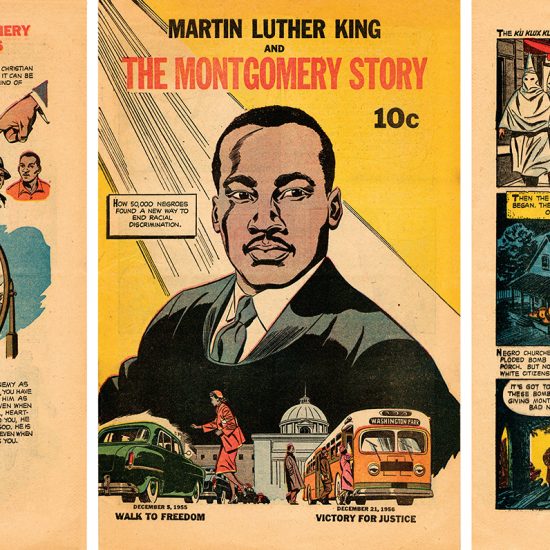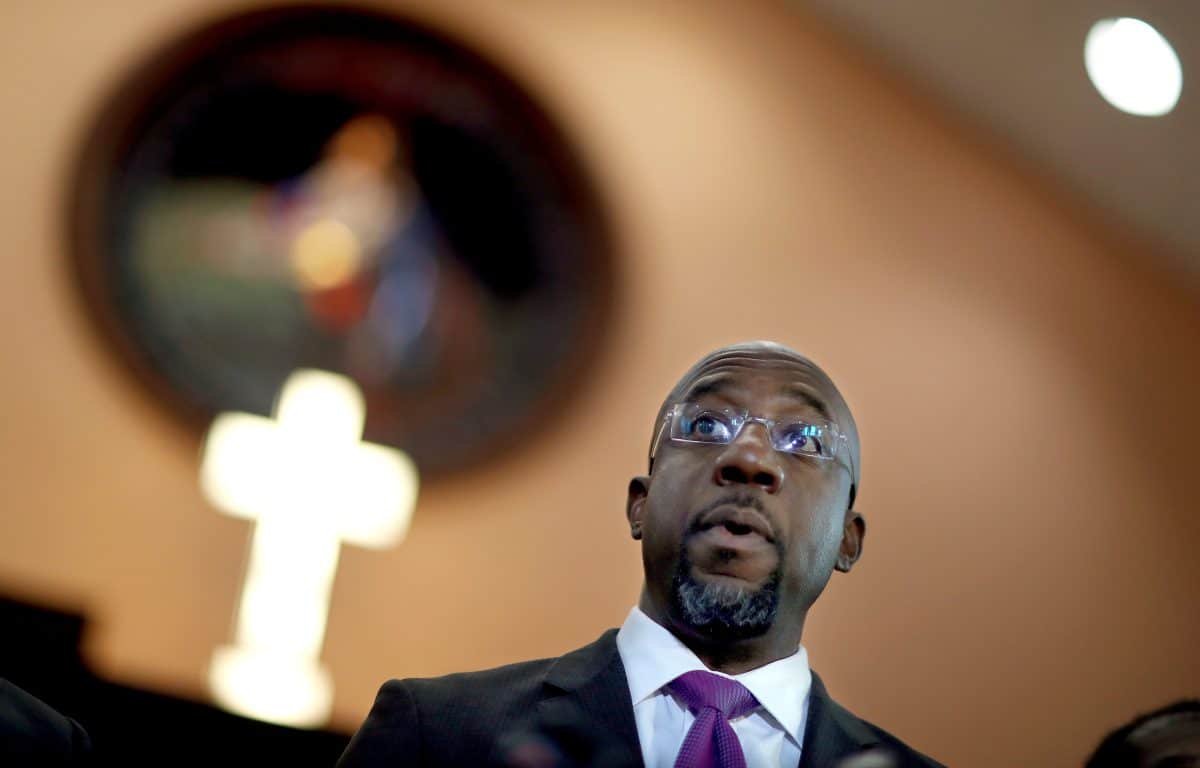
When U.S. Sen. Raphael Warnock walked onto the stage Friday night (Oct. 14) for a primetime debate in the midst of his reelection campaign, the junior Democratic senator from Georgia wisely decided against challenging his opponent to a 40-yard dash or a weight-lifting competition. I’m not suggesting Warnock, who is also the senior pastor of Ebenezer Baptist Church in Atlanta, isn’t in shape. I’m sure he could defeat most members of the Senate, where he’s still relatively young (and I’m not too confident how well I’d do against him). But Warnock wouldn’t have won those athletic challenges against former college football star Herschel Walker. Fortunately for Warnock, athletic prowess has no bearing on who would better serve the people of the Peach State in Congress.
But Walker wasn’t as smart with his debate strategy. At times, the NFL star-turned-Republican candidate seemed confused if he was running for Congress or seeking a pastoral job. And he fumbled while attempting a biblical scrimmage against a man with a Ph.D. from Union Theological Seminary.
From the beginning of the debate, Walker made it clear his strategy was to try to score religious points. He started his opening remarks by declaring, “First, I’d like to acknowledge my Lord and Savior, Jesus Christ.” Later, when pressed about the reports he paid for a girlfriend’s abortion, he quickly invoked his faith both defensively and offensively.
“On abortion, you know I’m a Christian, I believe in life,” he said before misrepresenting his own stated positions on the topic.
Walker then attacked Warnock for arguing the government shouldn’t be in the exam room with a woman and her doctor. Walker argued, “I’ve not seen too many pastors that will say that statement.”
Warnock defended his public policy position by explaining that his personal faith and his role as a pastor led him to “have a profound reverence for life and a deep respect for choice.”
Walker responded with an odd theological retort: “Instead of aborting those babies, why are you not baptizing those babies?” The U.S. government rightly does not take a stand on whether we should be baptizing infants or not. But such lecturing by Walker is even more absurd since he’s criticizing a pastor who is … checks notes … Baptist. You know, the people who literally got their name because they opposed infant baptism and insisted on immersion after conversion!
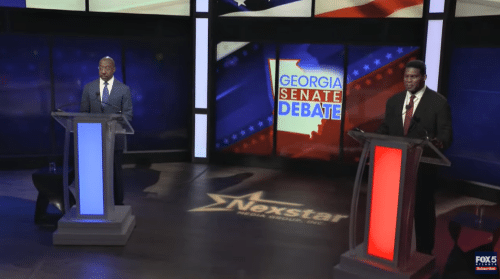
Screengrab as Sen. Raphael Warnock (left) and Herschel Walker debate on Oct. 14, 2022.
Unaware he was running in the wrong direction, Walker pushed ahead. He attacked Warnock for previously saying that “even God gave us a choice.”
“He’s correct: God gave us a choice,” Walker said. “But also within the Bible, if you read the Bible more, God said choose life. In the Bible it says I give you a choice. It says like Adam and Eve had a choice, but they chose death.”
Warnock responded simply, “I think he wants to arrogate to politicians more power than God has” — a burn that elicited laughter and applause from the studio audience as Walker seemed to argue God gave people a choice but the government should not allow choice.
Walker’s flashing of a fake police badge during the debate in a bizarre attempt to defend himself against criticism for pretending to be a police officer garnered more headlines. But his invoking of the Bible to accidentally push a pro-choice philosophy also proved to be a revealing faux pas.
The whole line of attack was irrelevant for who would best serve the people of Georgia in Congress. But the debate wasn’t the first time Walker or other politicians have tried to defeat Warnock with a debate about the Bible. In fact, Republicans have frequently attacked Warnock’s religious credentials. In doing so, they echo the treatment of one of Warnock’s predecessors at Ebenezer Baptist Church: Rev. Martin Luther King Jr.
This issue of A Public Witness examines the political attacks on Warnock’s faith during this campaign and his previous run, and also considers similar attacks on King. This rhetoric exposes how some preachers and politicians supporting the dominant power structures seek to excommunicate the Black church as not really Christian.
Get cutting-edge reporting and analysis like this in your inbox every week by subscribing today!
Attacking the Reverend
“Warnock’s a preacher who doesn’t tell the truth. He doesn’t even believe in redemption,” Walker claimed in his first video after the explosive allegations that he paid for a girlfriend’s abortion.
Warnock not only believes in redemption but preaches it from the pulpit. And he understands it deeply, both from his seminary studies and decades of pastoral experience. So, it’s an odd charge.
In terms of messaging strategy, it seems like a poor decision to refer to Warnock as a preacher instead of a politician. After all, politicians are less liked in polls and less trusted to tell the truth. But that labeling seems to reveal what really irks Republicans about Warnock. The party supported by the Christian Right isn’t sure what to do with a Christian pastor fervently on the left — and sees such a witness as a direct threat to their own attempted monopoly on morality.
Walker has frequently questioned Warnock’s theology during the campaign. For instance, on the Fox News show Hannity on Monday, he attacked Warnock and said about the preacher, “Don’t pretend that you know the Bible.” And Walker complained in August that people don’t hold Warnock accountable, adding, “They let him say and do whatever he wants to say and nobody ever calls him on it, nobody wants to call him on anything he says and I’m like, ‘Some of that stuff is not biblical.’” Walker didn’t specify what he found unbiblical or why it would matter as a voting criterion in light of the Constitution’s prohibition on religious tests for office.
And it’s not just Walker. Other conservatives have tried to attack Warnock’s theology as Walker runs for a nonsectarian political office.
As the abortion news rocked Walker’s campaign, his supporters went after Warnock’s pastoral credentials instead of his senatorial record. Anthony George, senior pastor of First Baptist Church in Atlanta, hosted a prayer gathering for Walker the morning after the abortion news broke. Then George went on the Todd Starnes Show to defend Walker. George also attacked Warnock as “a so-called Baptist preacher.”
U.S. Rep. Marjorie Taylor-Greene of Georgia, complained on Charlie Kirk’s show Monday that Warnock “calls himself a Christian, calls himself a pastor.” Similarly, conservative pundit and radio host Erick Erickson tweeted to defend Walker amid the abortion allegations by criticizing someone for “thinking Reverend Warnock is actually a Christian.”
The National Republican Senatorial Committee even released an attack ad on Warnock questioning his faith: “This guy has no problem with aborting babies who are inconvenient. And the worst part: this guy claims to be a Christian.” But voters in Georgia aren’t being asked to decide on his standing as a Christian, just his membership in the U.S. Senate.
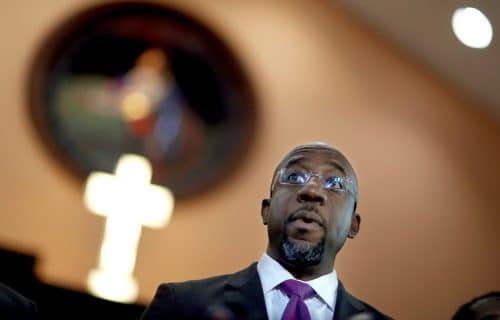
Rev. Raphael Warnock speaks at Ebenezer Baptist Church in Atlanta, Georgia, on Jan. 12, 2018. (David Goldman/Associated Press)
Walker’s campaign also resurrected a 2020 Republican attack against Warnock by criticizing the pastor for a sermon saying “nobody can serve God and the military.” Yet, his remark as he talked about the words of Jesus in the “Sermon on the Mount” is a basic, historic Christian belief. Jesus told his followers that “no one can serve two masters.” As a pastor, Warnock urged people to agree: “America, nobody can serve God and the military. You can’t serve God and money. You cannot serve God and mammon at the same time. America, choose ye this day who you will serve.” Walker’s free to criticize Warnock’s political policies toward the military as a senator, but this attack on Warnock’s sermon is really a rebuke of Jesus by a candidate who claims he’s running because he loves Jesus.
During the 2020 campaign, conservatives didn’t just attack Warnock over sermon snippets about serving Jesus above all. Al Mohler, a prominent evangelical voice who leads Southern Baptist Theological Seminary, suggested Warnock isn’t really a Christian but instead wants a “complete transformation of Christianity” with “a new theology that denies the basic truths of the gospel, that denies the authority of scripture, that denies the historicity of the very events central to Christianity, that redefines all Christian doctrine and of course eventually redefined all Christian morality.”
And Doug Collins, a Southern Baptist pastor who served in the U.S. House of Representatives before losing in the Senate race Warnock won in 2020, attacked Warnock and his church on the issue of abortion: “There is no such thing as a pro-choice pastor. What you have is a lie from the bed of Hell. It is time to send it back to Ebenezer Baptist Church.”
Attacking Warnock’s standing as a pastor — instead of his policies as a senator — seems like a questionable political strategy. But this isn’t the first time that politicians and preachers have tried to demonize a pastor of the historic Ebenezer Baptist Church.
Nothing New Under the Sun
Three days after Martin Luther King Jr.’s assassination on April 4, 1968, Wheaton College in Wheaton, Illinois, hosted a memorial service for him. That move by the evangelical Christian school sparked a letter of protest to the president from Tim LaHaye, a pastor in California who later would be known for helping found Christian Right political groups like the Moral Majority and for writing books like the Left Behind novels. LaHaye told Wheaton’s president he found it “very difficult to believe” the school held a memorial service for King.
“It seems incredible that a Christian college could participate in honoring an out-right theological liberal heretic,” added LaHaye before implying he would discourage people from attending the school unless the school disavowed the service.
LaHaye wasn’t alone. Both during King’s lifetime and since, preachers and politicians suggested the Baptist pastor and civil rights leader wasn’t a real Christian.
Fifty years later, John Piper of Bethlehem College & Seminary in Minneapolis, Minnesota, spoke on the anniversary of King’s assassination at an event hosted by the public policy arm of the Southern Baptist Convention. Although Piper praised King for fighting racism, he questioned the salvation of the civil rights leader. Piper excommunicated King for “the sin” of not taking some biblical stories literally. And Piper suggested King may have never repented — “I don’t know if he came home” — thus placing King’s entire ministry, including his tenure at Ebenezer, under the cloud of alleged heresies.
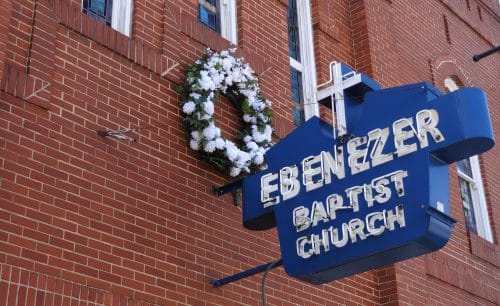
Ebenezer Baptist Church in Atlanta, Georgia. (Brian Kaylor/Word&Way)
That wasn’t the first time the SBC’s public policy group sparked controversy for criticizing King. As the rightward shift in the SBC occurred throughout the 1980s, trustees met in 1988 to elect a new public policy leader, Richard Land (who would lead the group until he was sidelined in 2012 amid controversies about racist, plagiarized remarks). As the group selected Land in 1988, remarks by a trustee sparked national attention. Apparently upset that Land praised King during a conversation, Curtis Caine called King a “fraud,” adding, “We have to be very careful that we don’t be caught up in the endorsement of, quote, the reverend, unquote, Martin Luther King.” Caine also praised the apartheid regime in South Africa, insisting the system of “separate development” was “beneficial.”
Similarly, Rev. Jerry Falwell, who later led the Moral Majority, criticized King before his assassination by implying he wasn’t a real minister and blaming King as one of the “wicked men with wicked motives” responsible for violence in cities.
“Under the guise of non-violent demonstrations, social reform, religious ministry, etc., mercenary agitators like Martin Luther King Jr. and others are allowed to go from city to city bringing chaos and destruction everywhere they are found,” declared Falwell, who later opposed the creation of MLK’s birthday as a holiday.
Even harsher attacks on King’s ministry and eternal status can be found on online discussion boards and social media posts (for your own mental health, don’t google it). These critics of King recognize that if they can cast King as a religious heretic, then they don’t have to wrestle with his theological critique of racism, economic exploitation, and militarism. Such preaching stands as an existential threat to the Caesars of our day.
Help sustain the ministry of Word&Way by subscribing to A Public Witness!
A Persistent Witness
During the 2020 campaign, dozens of Black pastors across Georgia signed an open letter criticizing the attacks on Warnock’s preaching and ministry. They urged Republican nominee Kelly Loeffler to stop making “false characterizations” about Warnock. The pastors added, “We see your attacks against Warnock as a broader attack against the Black Church and faith traditions for which we stand.” And Rev. Timothy McDonald III, pastor of First Iconium Baptist Church in Atlanta and a former assistant pastor at Ebenezer, told the Associated Press during that campaign, “The Republican attack is not just against Warnock, it’s against the Black church and the Black religious experience.”
And it is the witness of the Black church — as represented by King and Warnock at Ebenezer — that threatens to upset the political status quo. That’s why Obery Hendricks, a visiting research scholar at Columbia University and professor emeritus at New York Theological Seminary, believes right-wing politicians and preachers see the Black church as a threat.
“Martin Luther King showed that the Black church, with all its failings, can be a powerful force when mobilized and can bring the kind of change that the right-wing stands against, like equal rights, like a well-functioning welfare state that cares for the least of these,” Hendricks, author of Christians Against Christianity: How Right-Wing Evangelicals are Destroying Our Nation and Our Faith, told me. “The kind of Christianity that Martin Luther King, Ebenezer Church, and Warnock represent shows that the Christianity that [their critics] practice is hate-filled and is willing to exclude people not like them. It shows that their brand of Christianity really in many ways is not biblical Christianity. I think that’s the biggest fear: that the people will look at folks like Warnock and other committed religious figures, and then look at the right-wing and say these folks don’t represent the faith.”
“It shows that what they stand for is in actuality anti-Christian,” add Hendricks about those attacking Warnock’s faith. “It shows that their brand of Christianity is not about faith, but it’s about ideology, it’s about their interests. It’s like they make idols of their own interests and say that’s Christianity. And people like Warnock, Martin Luther King, and fighters for civil rights show that they’re lying, that their Christianity is bogus.”

The tomb of Martin Luther King Jr. and Coretta Scott King, which sits next to the historic Ebenezer Baptist Church building. The text on the steps in the water declares, “Until justice rolls down like water and righteousness like a might stream.” (Brian Kaylor/Word&Way)
As Hendricks noted, underneath the politics of the U.S. Senate race in Georgia is a clash between two visions of Christianity. And the mere faithful presence of the Black church has long been perceived as a threat by those who preach an opposing political gospel.
That’s why Black churches have often been targeted for racial violence. Like the bombing of the 16th Street Baptist Church in Birmingham, Alabama, that killed four young girls there for Sunday worship, or the repeated bombings of Bethel Baptist Church in Birmingham (including on Christmas Day), or the arson attacks on multiple churches in Georgia after holding voter registration meetings. And even before that, like the massacre at a small church in Elaine, Arkansas, as Black sharecroppers gathered to advocate for better wages, or when a bloodthirsty lynch mob burned down a Baptist church in Georgia and threw the bodies of slain Blacks into the fire. And more recently, like the mass shooting at Mother Emanuel Church in Charleston, South Carolina, or the burning of a church in Massachusetts to protest the election of Barack Obama.
Countless more attacks on Black churches have occurred. Just for being Black churches. But their witness continues and cannot be stopped. A church tradition that survived centuries of slavery, lynchings, bombings, arson attacks, and more cannot be destroyed by a few television ads, a sloppy debate performance, or even a loss in an election.
As a public witness,
Brian Kaylor

